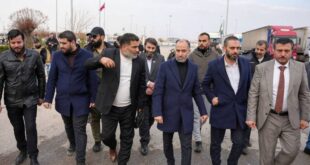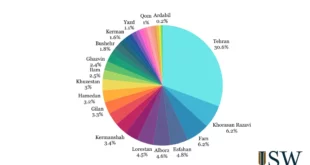BRUSSELS (AFP) — More than 80 foreign ministers and officials gathered in Brussels Tuesday for a conference aimed at showing solidarity with violence-wracked Iraq, and to hear Baghdad’s plans for how to rebuild it.
While organisers admitted the Brussels talks may be short on major new initiatives, they played up the symbolism of a meeting co-hosted by the EU and the United States, whose ties were deeply strained by the 2003 Iraq war.
“The international consensus that has long eluded us on Iraq is now in place,†said European Union foreign policy chief Javier Solana ahead of the two-day summit, starting Tuesday evening.
UN Secretary General Kofi Annan was to join ministers including US Secretary of State Condoleezza Rice, as well as foreign ministers from Iraq’s neighbours including notably Iran and Syria, the G-8, NATO and the Arab League.
The talks come at a delicate time for Iraq, where deadly attacks surged despite the election of an interim government, and where over 130,000 US soldiers remain stationed with no timetable for withdrawal.
“The situation in Iraq is critical. We need the help of the international community to support the transitional government,†said an Iraqi diplomat.
Iraqi Foreign Minister Hoshiyar Zebari, part of a 30-strong delegation headed by Prime Minister Ibrahim Jaafari, hopes the talks will support his government as it drafts a new constitution and prepares for new elections later this year.
“The main goal of this conference is to reengage the international community in stabilising and building Iraq,†he said.
US President George W. Bush hailed the fact that the EU was co-hosting the talks when he met EU leaders in Washington Monday.
“It’s an important signal for people to hear loud and clear, that there may have been past differences over Iraq, but as we move forward there is a need for the world to work together,†he said at the White House.
On the economic front, Iraq wants donor countries to fulfil their commitments, said Zebari. Baghdad has complained about delays in delivery on pledges already made, including $18 billion from the United States.
Debt relief has been billed as a key agenda item but there was no indication whether new offers were in the pipeline beyond the $32 billion package announced by the Paris Club of creditor nations in November.
Iraq also hopes that the Brussels conference will provide support to reform its judicial and penal systems, in serious need of strengthening to help get a grip on the continuing unrest, more than two years after Saddam’s ouster.
On this front the EU is set to launch an unprecedented initiative next month by training some 800 Iraq judges, senior officials and police officers. The instruction will take place outside of Iraq itself.
For the Europeans, the conference will mark another step in restoring transatlantic cooperation severely strained by the Iraq crisis.
An EU diplomat denied that the conference was purely symbolic, but also downplayed prospects of dramatic concrete action — for that she pointed to a donors’ conference due in mid-July in Amman.
“I don’t think you have to look for new initiatives (at the Brussels conference). It is more about reaffirming principles,†she said.
 Eurasia Press & News
Eurasia Press & News


